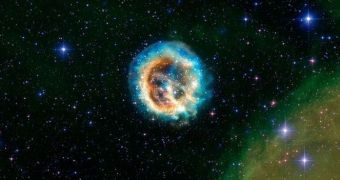According to a newly-proposed scientific theory, Universal expansion may be nothing more than an illusion. The Greek team of astronomers that made the statement believes that the entire Cosmos is in fact decelerating, not the other way around.
Experts led by cosmologist Christos Tsagas – who is based at the Aristotle University of Thessaloniki, in Greece – believe that the illusion is very similar to the type of light plays that occur in the desert.
This proposal has considerable implications for the fields of cosmology and astrophysics, considering that many theories explaining the way the Universe is set up are based on the idea that an ever-accelerating expansion is driving matter away from itself.
Universal expansion was discovered back in 1929. About 70 years later, cosmologists analyzing the light emitted by supernovae determined that galaxies appeared to be growing ever distant from each other at an accelerating pace, which was another huge breakthrough.
But these practical observations did not match what experts were expecting to see, where gravity is the most important force in open space. According to theory, the force should have pulled matter closer together, not farther apart.
This is how dark energy was born, out of the necessity to explain the complex contradictions between theories and reality. The stuff is believed to be responsible for driving expansion. But Tsagas argues that these observations are nothing but false impressions.
In fact, the expert and his team believe, the Universe is slowing down, as one would expect to see if gravity reigned supreme. This proposal eliminates the need for dark energy, while at the same time proposing a more acceptable fate for the end of the Cosmos.
Under expansion theories, the entire Universe is poised for one Big Rip, where the structure becomes too stretched that it eventually breaks loose. With the new proposal, the Greek experts say that the Cosmos will simply roll to a standstill after expansion slows down completely.
Details of the new proposal were published in a recent issue of the peer-reviewed journal Physical Review D. Tsagas explains that his work is based on observations conduced by NASA Observational Cosmology Laboratory expert Alexander Kashlinsky, Space reports.
The latter determined that the local region of the Universe in which we are located, a bubble about 2.5 billion light-years across, is moving at high speed in respect to the rest of the Cosmos. This may help account for why we are perceiving it to expand, when in fact it may be slowing down.
“My article discusses how observers living inside such a large-scale 'dark flow' could arrive at the (false) conclusion that the Universe is accelerating, while it is actually decelerating,” Tsagas explains.
“Peculiar motions have a very characteristic signature. Observers will 'measure' slightly faster acceleration in one direction and slower in the opposite, as a result of their own drift motion alone,” he goes on to say.
The main immediate implication Tsagas' work has is that it places a limitation on the phenomena that may be driving cosmic expansion. In other words, the Universe may either by controlled by dark energy or a dark flow, but not both or neither at the same time.

 14 DAY TRIAL //
14 DAY TRIAL //